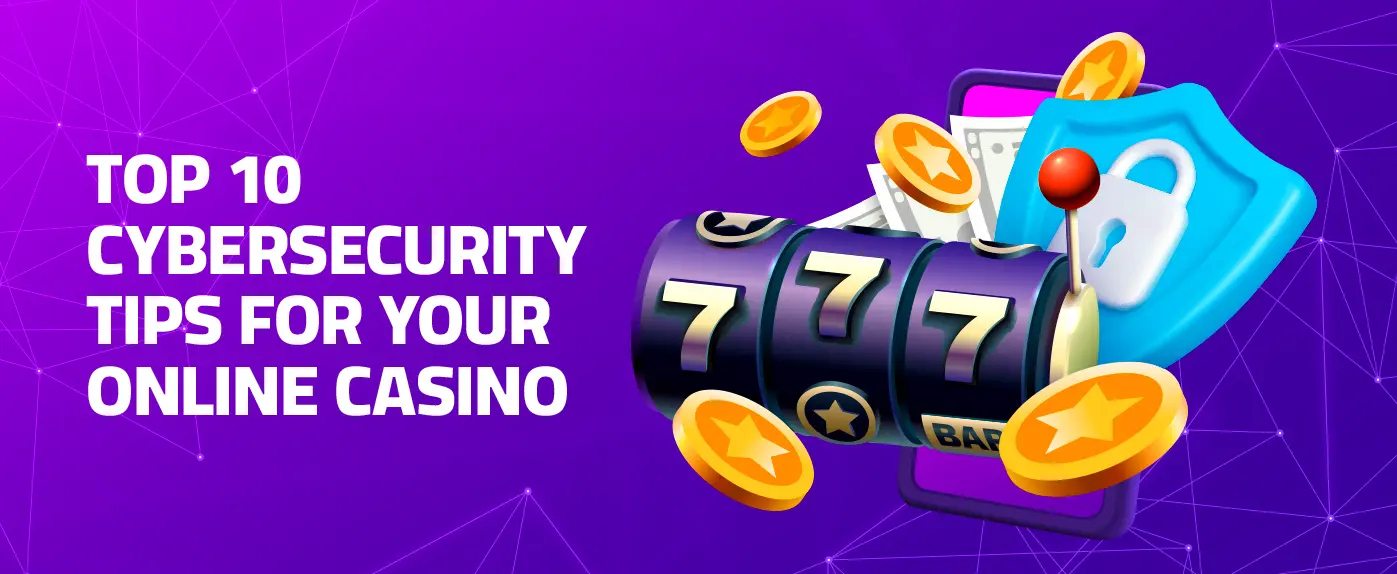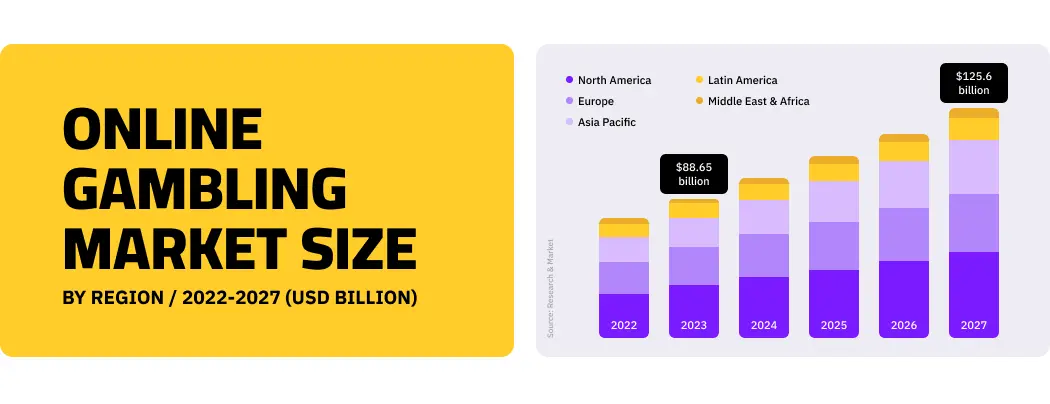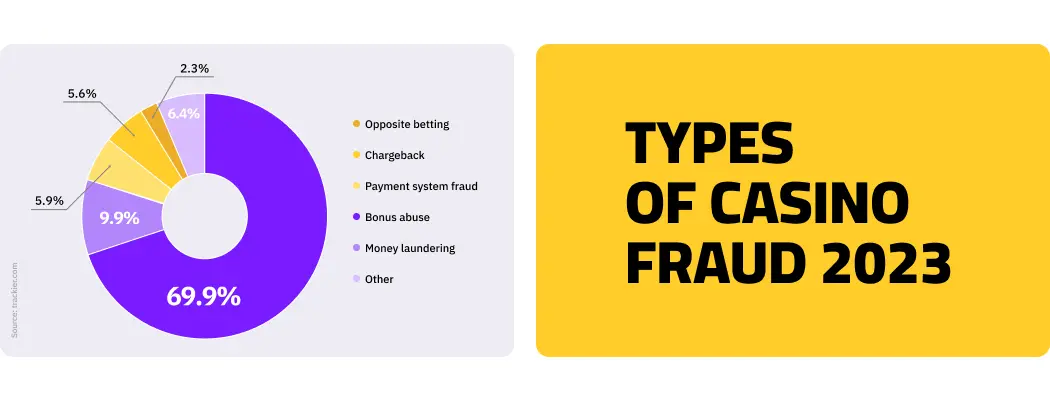
Top 10 best practices to secure your online casino and build players’ trust
Returning to the digital gambling landscape’s origins in the 1990s, we witness a remarkable evolution. It has grown from a niche hobby into a multi-billion-dollar juggernaut, captivating players globally. According to the 2023 Online Gambling Global Market Report by Research & Market, in 2022 the online gambling market boasted a staggering $81.08 billion, projected to surge to $88.65 billion by 2023, with a robust CAGR of 9.3%.
Nonetheless, this unprecedented success brings significant responsibility when it comes to online casino security. While legitimate businesses flock to the industry’s financial allure, it has also beckoned malicious actors, eager to exploit vulnerabilities for illicit gains. Ensuring the longevity and integrity of secure casino websites demands traversing a challenging landscape marked by regulatory complexities, cybersecurity threats, and an unwavering commitment to nurturing and preserving players’ trust.
Let’s see what the industry looks like nowadays, the consequences of poor cybersecurity navigation, and how online casinos can reinforce their casino data security and build robust player trust.
Understanding the iGaming landscape
The onset of the pandemic marked a turning point for the gambling industry. With individuals confined to their homes, the demand for digital entertainment skyrocketed, prompting a remarkable transformation in the world of iGaming. The industry’s evolution from its early, humble origins to its present stature as a financial powerhouse is nothing short of spectacular.
Technological advancements, such as enhanced graphics, AI-driven game development tools, and seamless user experiences, have transformed online casinos into sophisticated secure gambling platforms capable of delivering unparalleled entertainment worldwide in the form of websites, mobile apps, and live casinos to name a few.
The industry continues growing; the global online gambling market is expected to reach $125.6 billion by the end of 2027. At the same time, the projected volume for the Latin American market stands at $7.38 billion by the end of 2027, according to Statista.

However, this financial allure has a flip side. The substantial sums of money involved provoke issues with online casino safety and make businesses attractive targets for fraudsters, cybercriminals, and money launderers. The stakes are high for the gambling sector, with cyberattacks increasing by 1,000% annually and the average data breach costing more than $4 million.
Forewarned is forearmed: navigating cybersecurity issues in online casinos
Online casinos, much like other online businesses, gather and store sensitive player data needed for tasks like managing accounts, processing payments, and tailoring gaming experiences. It includes gaming activity, financial details, personal data, and identity verification documents that are crucial to keep safe, especially in the LatAm region, where users value the security of their accounts. However, this valuable data makes online casinos enticing targets for cybercriminals. Poor data breach prevention and weak casino account security can lead to financial fraud, identity theft, and reputational damage. Let’s see the most prevalent casino scams for 2023, according to trackier.com.

- Bonus abuse: exploiting casino bonuses through multiple accounts or tricky tactics.
- Money laundering: hiding illegal funds by making them appear as gambling winnings.
- Payment system fraud: cheating online casinos by manipulating payment methods.
- Chargeback: disputing legitimate gambling transactions to get a refund after winning.
- Opposite Betting: using promotions and odds differences to ensure a win, no matter the result.
Even industry giants like MGM Resorts International, Caesars Entertainment, Stake.com, with robust cybersecurity precautions, are still prime targets for solid hacker groups.
Therefore, operators must keep an extra close eye on cybersecurity risk management, implementing security measures, encryption, and privacy policies to protect against breaches and violations.
Top 10 online gaming safety measures
Let’s explore mission-critical safety best practices for online gambling to help you ensure a safe and sound entertainment space for your players.
#1. Implementing SSL encryption
What it is: In practice, SSL (Secure Sockets Layer) encryption technologies function as the digital stronghold of online casinos. It guarantees that any data interchange between players and the casino remains concealed within an unassailable code, impeding any attempts by hackers to infiltrate.
Why it matters: SSL encryption safeguards sensitive information such as email and card details during transmission, ensuring player account protection and data integrity.
#2.Introducing secure payment gateways
What it is: Operators should partner with trustworthy payment processors and gateways to facilitate secure withdrawals and deposits. These platforms employ encrypted code and stringent security protocols to ensure secure payment methods.
Why it matters: Secure payment gateways protect money transactions, shielding both casinos and players from fraud.
#3. Applying fraud detection and prevention systems
What it is: Advanced fraud detection systems analyze player behavior, looking for irregularities or suspicious patterns that might indicate fraudulent activities.
Why it matters: Detecting and preventing fraud is imperative for upholding gaming space integrity and ensuring gaming account protection.
#4. Incorporating player verification and KYC processes
What it is: Know Your Customer (KYC) processes involve player identity verification, often through two-factor casino site authentication, to ensure players are who they claim to be.
Why it matters: KYC procedures deter identity theft and guarantee adherence to regulatory requirements, fostering a safe gaming atmosphere.
#5. Embracing random number generators (RNGs)
What it is: Online casinos utilize RNGs to maintain the fairness of their games. These algorithms produce random results, ensuring an equitable gaming experience for all participants.
Why it matters: Ensuring fairness is pivotal for establishing player trust, and RNGs offer transparency in results, bolstering online casino trustworthiness.
#6. Recognizing responsible gambling
What it is: Responsible gambling practices aim to cultivate safe and moderated gaming behaviors. Online casinos provide tools and support to empower players to establish limits, take breaks, or access assistance when required. So does BGaming, creating games that not only entertain but offer users a positive experience and ensure they feel safe and secure while playing.
Why it matters: Responsible gambling plays a crucial role in shielding players from addiction and fostering a balanced and enjoyable gaming experience.
#7. Following legal regulations
What it is: Respected online casinos acquire licenses from established regulatory authorities, showcasing their dedication to upholding strict privacy protection and industry benchmarks. For instance, the Ministry of Foreign Trade and Tourism (Mincetur) is the official gambling regulator in Peru, while in Argentina, gambling is regulated on a province-by-province basis, with operators only allowed to offer their services to residents of their province.
Why it matters: Licensing and regulation guarantee that casinos function equitably, securely, and in accordance with legal requirements.
#8. Holding regular security audits and testing
What it is: Online casinos undergo regular security audits and testing by unbiased third-party firms such as iTechLabs and BMM Testlabs to pinpoint any vulnerabilities or weaknesses within their systems. For instance, BGaming certifies games, RNG, and RGS for particular markets, adjusting them to the rules outlined in the gaming laws of these countries.
Why it matters: Ongoing security audits enhance a casino’s ability to adapt to evolving threats and maintain a high level of safe betting online.
#9. Educating staff about security measures:
What it is: Online casino staff receive training on safe gambling practices to prevent internal data breaches and system loopholes.
Why it matters: Competent and knowledgeable staff is essential in ensuring the integrity of the gaming environment.
#10. Building trust with players through reliable game providers
What it is: Building player trust is an ongoing effort. It involves offering transparent, certified games, showcasing reviews and popularity, providing privacy tips for gamblers, and rewarding loyal players – all with cooperating with a trustworthy iGaming content provider like BGaming that got industry recognition in such prominent awards as AskGamblers Awards, SiGMA Awards, EGR B2B Awards, iGaming Idol, and many others.
Why it matters: Trust is the foundation of any successful online casino, and these strategies help create a sense of security and loyalty among players.
To put it briefly
Cybersecurity is non-negotiable, given the industry’s financial significance and data sensitivity. Top security measures like SSL encryption and trusted payment gateways safeguard the casino’s reputation and player information security.
Stay vigilant with regular security audits, legal compliance, and staff training, while building and maintaining player trust through transparency, secure gambling guidance, reviews, and rewarding loyalty.
In this dynamic industry, cybersecurity in online casinos and trust are constants. Implementing these best practices ensures a secure and enjoyable gaming environment, securing the industry’s future as online casinos continue to expand.
Ready to enhance your casino’s security and reputation? Contact the BGaming team to integrate certified games.





